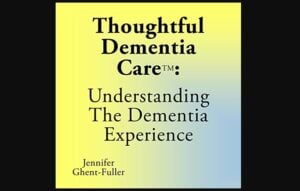Welcome
Alzheimer’s & Dementia Weekly was inspired by my mother’s journey with autoimmune dementia and my dad’s with Parkinson’s dementia.
Walking beside them opened my eyes to the confusion, the courage, and the deep humanity found in families and professionals caring for someone they love.
Since its debut in 2007, this site has had one clear mission:
to separate the wheat from the chaff — to highlight only the most essential articles, studies, tools, and videos from the overwhelming river of dementia-related information.
(At last count, Google receives a new post on Alzheimer’s or dementia every seven minutes.) For anyone seeking clarity or support, that constant flow can be exhausting and discouraging.
Alzheimer’s Weekly filters, translates, and explains what matters most, helping hundreds of thousands of families, clinicians, and care teams around the world make sense of the latest research and best practices.
This site is dedicated to everyone who works—often quietly and tirelessly—to preserve dignity in the community of people living with dementia.
About the Editor
With experience in dementia caregiving, public education, and Alzheimer’s-focused writing—and a professional research background shaped in what many consider one of the world’s top laboratories—I work to make complex findings clear, practical, and genuinely helpful for both families and professionals providing care.
My goal is simple:
Translate the best science into guidance that lightens the load, strengthens understanding, and helps every person with dementia live with dignity.
Peter Berger
Editor, Alzheimer’s Weekly












Please have a look at Dr Peter Breggin – he is an amazing psychiatrist who is adamant that the psych drugs don't work at all, for anyone, and have horrendous side effects and can cause more problems. The only people who get anything from them are Big Pharm – it's all about the money 🙁
Every agitation comes from somewhere. It could be pain, confusion or other things. If the caregiver is good enough to assess the situation and could see the sick persons perspective, agitation could be avoided. We can avoid giving any medication that could produce more side effects that will harm the person.
I know from experience Celexa causes heart attacks.! I was prescribed Celexa and started having chest pains, had to spend a couple of nights in the hospital. Now I have heart problems.
So does eating bacon.
Constantine Lyketsos works for Lundbeck as a consultant/advisor so I'm not suprised he is pushing Citalopram because Lundbeck is the company that produce this drug. Citalopram has numerous side effects which includes agitation, anxiety nervousness confusion abnormal dreams pain in muscles and joints aggression hallucinations mania visusl disturbances difficulty sleeping to name but a few. I would rather find the cause of a persons agitation not mask it with a drug that causes numerous other problems. Read Peter Breggins book Your drug may be your problem, for a more honest and unbais opinion on the use of antidepressants and antipsychotic drugs. Another useful book is Bad Pharma by Ben Goldacre which gives frank details of the clinical trials revealed and hidden by the companies who produce these, in my opinion very harmful drugs. I believe these drugs do more harm that good when used by anyone let alone people living with the many types of dementia.
celexa caused me to begin to have chronic afib. i have to have cardic ablation now every few years
We have seen agitation eliminated in Alzheimer's patients with the use of 1072nm infrared light stimulation combined with brainwave biofeedback training. These two non-drug, non-invasive techniques have been studied separately and found to both be helpful but are more effective when used together. Marvin H. Berman PhD http://www.quietmindfdn.org